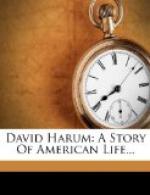“I must say that I think I should have liked the canal better,” remarked John as David paused. “You were, at any rate, more or less free—that is, comparatively, I should say.”
“Yes, sir, I did,” said David, “an’ I never see the time, no matter how rough things was, that I wished I was back on Buxton Hill. I used to want to see Polly putty bad once in a while, an’ used to figure that if I ever growed up to be a man, an’ had money enough, I’d buy her a new pair o’ shoes an’ the stuff fer a dress, an’ sometimes my cal’lations went as fur ‘s a gold breastpin; but I never wanted to see none o’ the rest on ’em, an’ fer that matter, I never did. Yes, sir, the old ditch was better to me than the place I was borned in, an’, as you say, I wa’n’t nobody’s slave, an’ I wa’n’t scairt to death the hull time. Some o’ the men was rough, but they wa’n’t cruel, as a rule, an’ as I growed up a little I was putty well able to look out fer myself—wa’al, wa’al (looking at his watch), I guess you must ‘a’ had enough o’ my meemores fer one sittin’.”
“No, really,” John protested, “don’t go yet. I have a little proposal to make to you,” and he got up and brought a bottle from the bottom of the washstand.
“Wa’al,” said David, “fire it out.”
“That you take another cigar and a little of this,” holding up the bottle.
“Got any glasses?” asked David with practical mind.
“One and a tooth mug,” replied John, laughing. “Glass for you, tooth mug for me. Tastes just as good out of a tooth mug.”
“Wa’al,” said David, with a comical air of yielding as he took the glass and held it out to John, “under protest, stric’ly under protest—sooner than have my clo’es torn. I shall tell Polly—if I should happen to mention it—that you threatened me with vi’lence. Wa’al, here’s lookin’ at ye,” which toast was drunk with the solemnity which befitted it.




